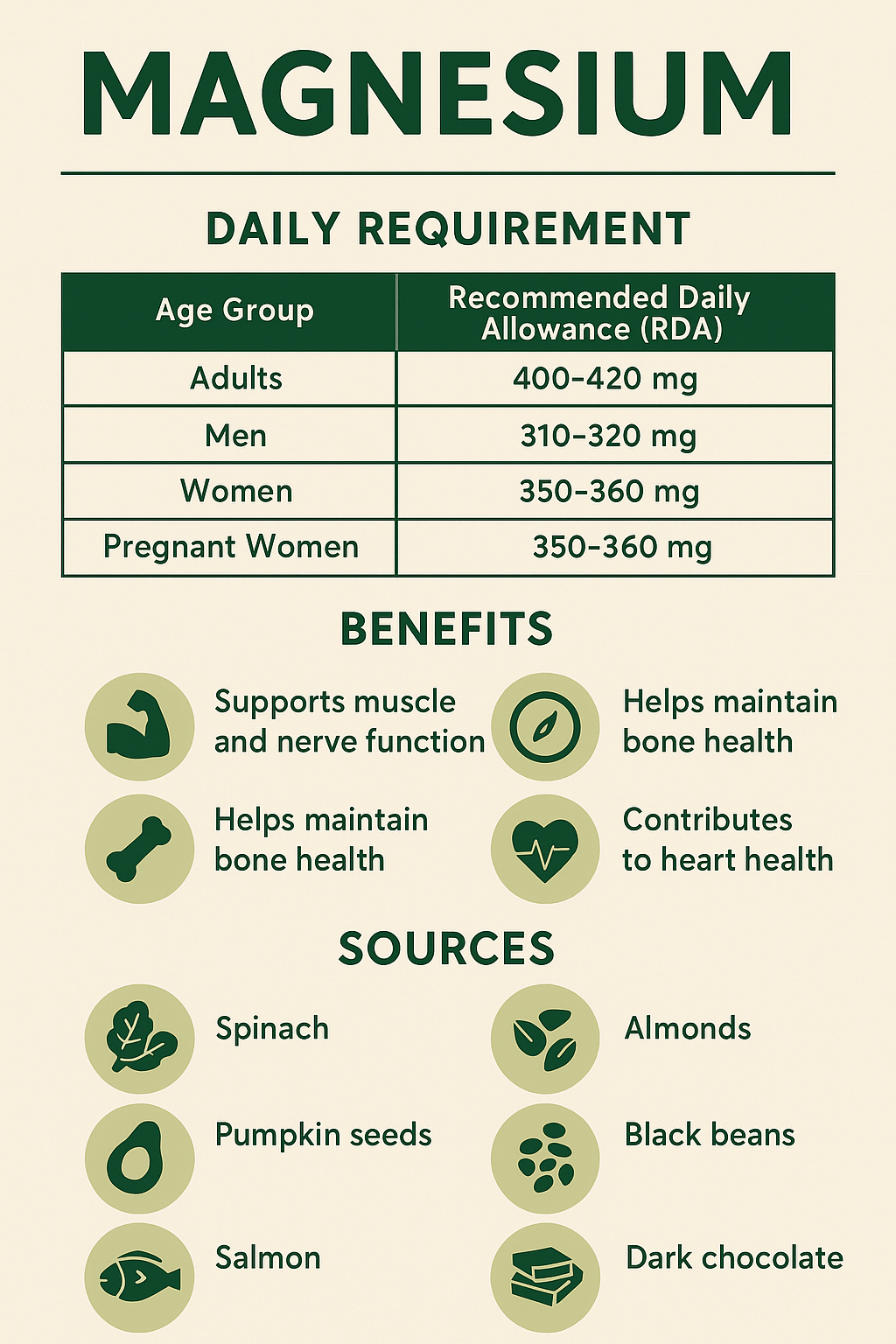Magnesium is an essential mineral and one of the body’s most important electrolytes. It plays a critical role in over 300 enzymatic reactions, including energy production, protein synthesis, muscle and nerve function, blood glucose control, and blood pressure regulation. Despite its importance, magnesium deficiency is surprisingly common due to poor dietary intake and modern lifestyles.
Why is Magnesium Important?
Magnesium supports multiple physiological processes:
- Muscle and nerve function: It helps muscles contract and relax and supports nerve signaling.
- Heart health: Magnesium keeps the heartbeat steady and helps maintain normal blood pressure.
- Bone health: It contributes to bone formation and helps in calcium absorption.
- Energy production: It’s vital for converting food into energy.
- Blood sugar control: Magnesium enhances insulin sensitivity and regulates glucose levels.
Recommended Daily Intake of Magnesium
The daily requirement for magnesium varies by age, gender, and life stage. Below are the general recommendations:
| Age Group | Recommended Daily Allowance (RDA) |
|---|---|
| Infants (0–6 months) | 30 mg |
| Children (1–3 years) | 80 mg |
| Children (4–8 years) | 130 mg |
| Boys (9–13 years) | 240 mg |
| Teen Boys (14–18 years) | 410 mg |
| Adult Men | 400–420 mg |
| Teen Girls (14–18 yrs) | 360 mg |
| Adult Women | 310–320 mg |
| Pregnant Women | 350–360 mg |
| Breastfeeding Women | 310–320 mg |
Common Signs of Magnesium Deficiency
- Muscle cramps or spasms
- Fatigue and weakness
- Nausea or vomiting
- Irregular heartbeat
- Mental disorders (anxiety, depression)
- Numbness or tingling
If left uncorrected, magnesium deficiency can lead to serious complications such as osteoporosis, hypertension, and cardiac arrhythmias.
Best Dietary Sources of Magnesium
To meet your daily magnesium needs, consider adding these magnesium-rich foods to your diet:
Vegetables and Greens:
- Spinach
- Kale
- Swiss chard
- Broccoli
Nuts and Seeds:
- Almonds
- Cashews
- Pumpkin seeds
- Sunflower seeds
Whole Grains:
- Brown rice
- Oatmeal
- Quinoa
- Whole wheat bread
Legumes:
- Black beans
- Chickpeas
- Lentils
- Soybeans
Fruits:
- Bananas
- Avocados
- Figs
- Dried apricots
Seafood and Animal Products:
- Salmon
- Tuna
- Mackerel
- Yogurt
Dark Chocolate:
Contains up to 64 mg of magnesium per 1 oz and is rich in antioxidants as well.
Tips to Improve Magnesium Absorption
- Avoid excess calcium supplements, as they may interfere with magnesium absorption.
- Limit alcohol and caffeine intake, both of which can deplete magnesium.
- Cook vegetables lightly, as overcooking can reduce magnesium content.
- Manage stress, since chronic stress can lower magnesium levels.
Should You Take a Magnesium Supplement?
While food sources are ideal, supplements may be necessary for individuals with medical conditions such as:
- Digestive disorders (e.g., Crohn’s, celiac disease)
- Type 2 diabetes
- Chronic alcoholism
- Prolonged use of diuretics or proton pump inhibitors
Consult a healthcare provider before starting any supplement regimen.
Final Thoughts
Magnesium is more than just a mineral—it’s a powerhouse nutrient essential for nearly every function in the human body. Ensuring an adequate daily intake through a balanced diet can help you stay energized, maintain strong bones, support heart health, and enhance overall well-being.




